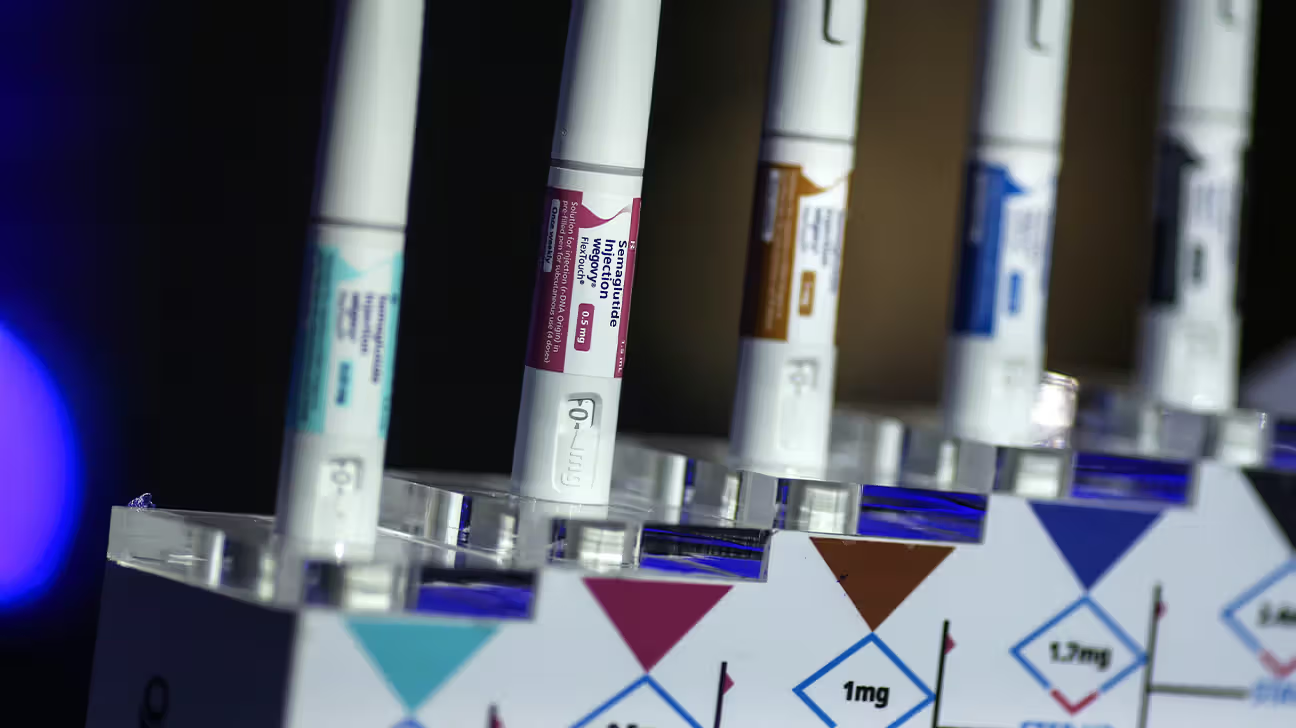
- A new Gallup poll indicates that the rate of obesity among U.S. adults has declined over the past three years.
- The decline is likely attributed to the growing number of people utilizing GLP-1 drugs for weight loss.
- Results from the poll also indicate that the rate of diabetes has climbed, hitting an all-time high.
A new survey reports that the obesity rate among adults in the United States is declining as the use of GLP-1 weight loss drugs rises rapidly.
The Gallup poll, which was released this week, indicates that women nationwide have a higher obesity rate than men and utilize weight management medications more often.
The pollsters report that people between the ages of 40 and 64 have higher obesity rates than other age groups. They also utilize GLP-1 drugs like Ozempic and Wegovy more often.
However, the pollsters also found that the rate of diabetes in the United States has climbed to a record high.
Although some experts point out that these numbers are based on self-reported data from survey participants, they say the conclusions align with what they observe in the field.
“The poll is in line with what I see in my own patient base,” said Kristin Kirkpatrick, RDN, a registered dietitian who is president of KAK Consulting as well as a dietitian at the Cleveland Clinic Department of Wellness & Preventive Medicine in Ohio.
“Most everyone is aware of these GLP-1 drugs. Many ask if they are candidates and weight loss in my practice has increased and women are more likely than men to utilize these drugs,” she told Healthline.
“I was a little surprised,” added Mir Ali, MD, a general surgeon, bariatric surgeon, and medical director of MemorialCare Surgical Weight Loss Center at Orange Coast Medical Center in California.
“It shows people are more aware of what’s available. It’s good to see this is having an impact,” he told Healthline.
The Gallup poll was conducted during the first nine months of 2025. Nearly 17,000 adults in the United States were interviewed online.
The participants were asked about their height and weight, as well as whether they had ever been diagnosed with either type 1 or type 2 diabetes, and whether they had been prescribed GLP-1 drugs.
The pollsters reported that their findings indicate the obesity rate in the United States has decreased from a record high of nearly 40% in 2022 to 37% in 2025.
The researchers said those declines translate into 7.6 million fewer people in the country having obesity.
They added that the obesity rate for females has dropped more than 3 percentage points to slightly less than 39%. The rate for males was calculated to have decreased more than 2 percentage points to 35%.
The obesity rate for people ages 40 to 49 was estimated to have fallen more than four percentage points to about 43%. The obesity rate among those ages 50 to 64 reportedly declined by five percentage points to slightly less than 43%.
The pollsters defined obesity as a person with a body-mass index (BMI) score of 30 or higher. They calculated those scores using a person’s self-reported height and weight.
David Cutler, MD, a family medicine physician at Providence Saint John’s Health Center in Santa Monica, California, issued some cautions on the data.
He noted that the obesity rate was based on BMI scores calculated on a person’s self-reported height and weight. He added that someone who has lost body fat and gained muscle mass could fall into the obesity category when they in fact don’t have obesity.
“We have to define what we’re talking about,” he told Healthline.
The pollsters also noted that their survey indicated that the diabetes rate has climbed to an all-time high of nearly 14% of the U.S. adult population.
Cutler had some hesitation on these figures, too.
He noted that survey participants were asked if they had ever been diagnosed with diabetes. For example, type 2 diabetes that is currently in remission despite a prior diagnosis could still fall in this category in the poll data. “In essence, the diabetes diagnosis never goes away,” he said.
Ali added that there are a number of factors that can lead to a diagnosis of type 2 diabetes. “There are other causes of diabetes other than just weight,” he said.
“Risk factors for development and worsening of diabetes go well beyond just weight, which is why weight status is not always the main cause of development of type 2 diabetes,” she said.
The researchers also reported that the percentage of U.S. adults taking GLP-1 semaglutide weight-loss drugs has risen sharply from nearly 6% in February 2024 to 12% today.
The poll indicated females are using these medications more often than males, with 15% of females surveyed saying they were utilizing GLP-1 drugs compared to slightly less than 10% of males.
About 17% of people 50 to 64 years of age reported using the medications compared to 16% of people in the 40 to 49 group.
About 11% of people 65 years and older said they were utilizing the weight-loss medications.
Experts say there is a simple reason more people are using these medications. They are an effective tool for a malady that has plagued many people their entire lives.
“Many of my patients came to me initially, years ago, related to the constant chatter of food, or food noise, and an inability to lose weight,” said Kirkpatrick.
“Constant cravings, feeling out of control, etc., were common themes. These drugs are effective in reducing these symptoms. In addition to this, they also delay gastric emptying, so not only do cravings go down, but the ability to consume large portions goes down with it.”
Cutler said that there is a significant percentage of people who are using GLP-1 drugs who do not have obesity. They are people who want to lose a relatively small portion of weight.
“They are taking them for cosmetic reasons. It’s also easier to take the drugs than to stay on a diet,” he said. “People using these medications need to be monitored,” Cutler added. “If they are, then the drugs are relatively safe and very effective.”
One is the drugs such as Ozempic and Wegovy that contain the active ingredient semaglutide. The other are medications such as Mounjaro and Zepbound that contain the active ingredient tirzepatide.
- increasing feelings of fullness
- reducing hunger
- reducing cravings for foods that are high in fat
However, there can be side effects. They include:
- constipation or diarrhea
- upset stomach, nausea, and vomiting
- headaches
- abdominal pain
- fatigue
Experts say people should be informed about all aspects of their weight loss journey using these medications.
The most important, they said, is that this is a long process without a lot of shortcuts.
“They need to understand that this is a long-term treatment for a chronic disease,” said Ali. “These drugs don’t work instantly.”
“You have to have good nutrition from the outset,” said Cutler. “You’re going to eat less when you start taking these drugs, so it’s important to eat well.”
“You have to come up with a strategy to maintain good lifestyle habits,” added Ali.
Kirkpatrick said this starts with talking with your doctor or other healthcare professional who can guide you in the proper direction.
“I think connecting with a company, healthcare provider, or medical group that provides abundant resources is a critical factor in long term success,” she said.
“Doing so can help you in assessing any contraindications there may be for starting the drug, assessing the actual need for the drug, and then when you begin, dosing and resources such as meal planning, exercise regimens, and access to expert advisors in diet, fitness, and mental health.”
Experts interviewed by Healthline said that people should also be aware that dehydration, nausea, and gastrointestinal discomfort may be part of the treatment process. They noted that an exit strategy should be part of the plan for people who can eventually stop using the medications.
Ali said that can include reducing the dosage as you near the end of the treatment regimen or spacing out the doses.
Cutler said it’s important that people not regain weight after they stop taking the drugs. He said that a constant shift between losing and regaining body fat, as well as losing muscle mass without regaining it, can put stress on the body. “You end up worse off than when you started,” he said.
Kirkpatrick noted it’s important to have a good healthcare team.
“If you’re going to do it, surround yourself with experts that can monitor safety and lifestyle change and can help you with planning an effective long-term plan that makes sense for you and your goals,” said Kirkpatrick.
“This plan may or may not include the off-ramp to getting off the drug once weight loss and metabolic health goals are achieved.”
Source link : https://www.healthline.com/health-news/obesity-rate-declining-weight-loss-drugs-gallup-poll
Author :
Publish date : 2025-10-30 11:50:53
Copyright for syndicated content belongs to the linked Source.





